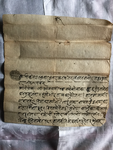A receipt from Jagat Śamśera acknowledging the treasury deposit of a fine paid by five headmen of Pācapārvā (VS 1912)
ID: Tsum_0001_0042
Edited and
translated by Nadine Plachta and Rajendra Shakya
Created: 2017-05-21;
Last modified: 2018-04-02
For the metadata of the document, click here
The accompanying edition, translation/synopsis and/or commentary are available under the terms of the Creative Commons Attribution-ShareAlike 4.0 International License
Abstract
This receipt from General Jagat Śamśera confirms the treasury deposit of a fine imposed on five headmen of Pācapārvā for providing logistical support to the Tibetan army and assisting a Tibetan deserter.Diplomatic edition
[1r]
श्रीः\[Seal of Jagata Śamśera Jaṅga Kũvara Rāṇā]1स्वस्तिश्रीमद्राजकुमारकुमारात्मजश्रीजनरलजगतसम्सेरजङ्गकुव़र2राणाजीकस्यपत्रम्¯¯¯ ¯¯¯ ¯¯¯ ¯¯¯ ¯¯¯ ¯¯¯ ¯¯¯ ¯¯¯
3आगेदाषी ला∙आमदानी∙१८सयेषोलाका∙ छ्वाङ्डुंडुसमेत
4घनसुम्जना५हस्तेभोट्तरफकाफौजलाईसातुसामलदि
5यावापत्र∙निमाट्यास्यांभोटेलाईसुम्यावापत्∙डंडभयाका
6मोहररुपैञा∙३६५तिनसयेपैसट्ठी∙सुवेदार∙कालुकार्किमार्फ
7त्∙तहवीलदार∙वषान्सींहस्तेदाषीलभयोतस्कोरसीदगरी
8दिञ्यू∙ईतिसम्वत्१९१२सालमीति∙माघवदी१३रोज२शुभम्
Translation
[1r]
[Seal of Jagata Śamśera Jaṅga Kũvara Rāṇā]
Hail! A letter from General Jagata Śamśera Jaṅga Kũvara Rāṇā, the venerable prince born of a prince.
Āge: The deposit [of] income: mohara rupaiyā 365, [rupees] three hundred and sixty-five, were given by five ghanasums1 , including Chvāṅ Ḍaṃḍu of Aṭhāra Saya Kholā, as a fine for providing logistical support (sātu2 , sāmala3 ) to Tibetan troops and for not handing over Nimāṭyāsyāṃ Bhoṭe4 [to the Tibetan army]. [The amount] was deposited in [the Tahabila] treasury, SubedāraKālu Kārkī [having placed the amount] in the hand of TahabiladāraBakhāna Siṃha. A receipt was issued for the same.
Monday, the 13th of the dark fortnight of Māgha in the [Vikrama] era year 1912 (1856 CE). Auspiciousness.
Commentary
Another document (Tsum_0001_0006) issued on the same day relates that Jagata Śamśera instructed the dvāres of Aṭhāra Saya Kholā not to trouble the five ganchens again because they had already paid the fine for helping the Tibetan army and for not turning over a deserter. However, the amount of the fine varies in these two documents. While the receipt at hand mentions 365 mohara rupaiyā to be paid by the five ganchens, Tsum_0001_0006 puts the fine at 350 mohara rupaiyā.
There are yet other documents (Tsum_0001_0008, Tsum_0001_0032) that have to do with the same issue. Tsum_0001_0008 instructs the village headmen to pay the amount agreed upon during a transaction in Kerung. Tsum_0001_0032 affirms the receipt of an unspecified amount as a fine for not handing ove the deserter to the Tibetan army. The former document shows that the headmen were reluctant to pay the fine, which resulted in two security officials being sent to the region to collect the sum. The latter imparts the information that the security officials were sent from the Patan Tahabila. They successfully collected the remaining penalty from the five ghanasums and deposited the amount into their treasury (i.e. the Patan Tahabila).
Both Tsum_0001_0008 and Tsum_0001_0032 were written around five to six months after Tsum_0001_0042 was issued. The present one documents that the five ganchens were given a receipt for paying the fine, as a result of which they were freed from their legal debt. However, they were later instructed to pay a certain amount for a related issue, which they eventually did.

